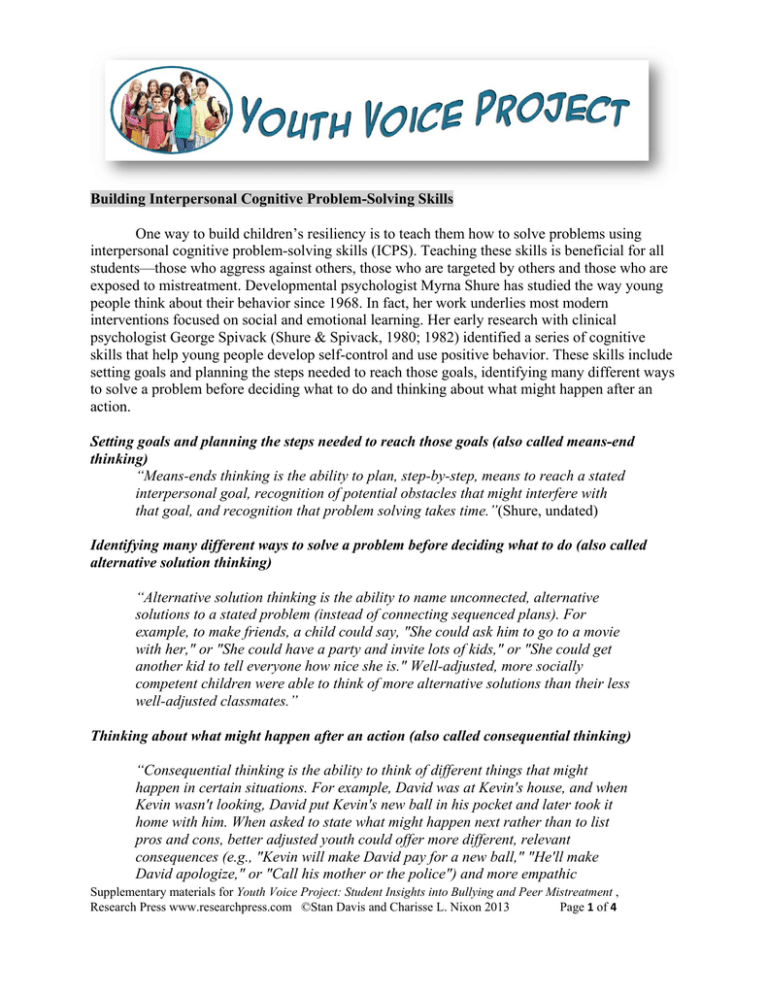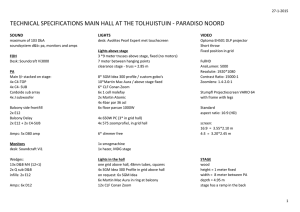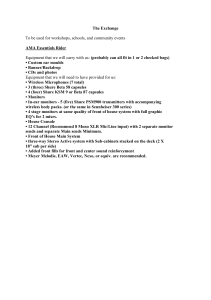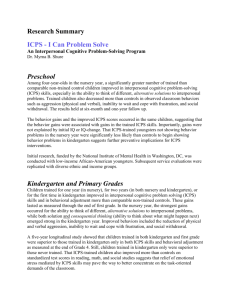Building Interpersonal Cognitive Problem
advertisement

Building Interpersonal Cognitive Problem-Solving Skills One way to build children’s resiliency is to teach them how to solve problems using interpersonal cognitive problem-solving skills (ICPS). Teaching these skills is beneficial for all students—those who aggress against others, those who are targeted by others and those who are exposed to mistreatment. Developmental psychologist Myrna Shure has studied the way young people think about their behavior since 1968. In fact, her work underlies most modern interventions focused on social and emotional learning. Her early research with clinical psychologist George Spivack (Shure & Spivack, 1980; 1982) identified a series of cognitive skills that help young people develop self-control and use positive behavior. These skills include setting goals and planning the steps needed to reach those goals, identifying many different ways to solve a problem before deciding what to do and thinking about what might happen after an action. Setting goals and planning the steps needed to reach those goals (also called means-end thinking) “Means-ends thinking is the ability to plan, step-by-step, means to reach a stated interpersonal goal, recognition of potential obstacles that might interfere with that goal, and recognition that problem solving takes time.”(Shure, undated) Identifying many different ways to solve a problem before deciding what to do (also called alternative solution thinking) “Alternative solution thinking is the ability to name unconnected, alternative solutions to a stated problem (instead of connecting sequenced plans). For example, to make friends, a child could say, "She could ask him to go to a movie with her," or "She could have a party and invite lots of kids," or "She could get another kid to tell everyone how nice she is." Well-adjusted, more socially competent children were able to think of more alternative solutions than their less well-adjusted classmates.” Thinking about what might happen after an action (also called consequential thinking) “Consequential thinking is the ability to think of different things that might happen in certain situations. For example, David was at Kevin's house, and when Kevin wasn't looking, David put Kevin's new ball in his pocket and later took it home with him. When asked to state what might happen next rather than to list pros and cons, better adjusted youth could offer more different, relevant consequences (e.g., "Kevin will make David pay for a new ball," "He'll make David apologize," or "Call his mother or the police") and more empathic Supplementary materials for Youth Voice Project: Student Insights into Bullying and Peer Mistreatment , Research Press www.researchpress.com ©Stan Davis and Charisse L. Nixon 2013 Page 1 of 4 responses, including, "David will feel bad 'cause Kevin thinks he lost his ball" (Shure, 1985). Possessing these skills is linked to positive outcomes. The correlational data revealed that... high ICPS [Interpersonal Cognitive Problem Solving] skills, especially alternative solution thinking skills, added significantly to the prediction of prosocial behaviors such as sharing and caring. Low ICPS skills contributed to the prediction of negative, impulsive, and inhibited behaviors. These relationships still held after the controlling effects for the Wechsler Intelligence Scale for Children-Revised Intelligence Quotient (WISC-R IQ) (vocabulary subtest) and academic skill…Further analyses revealed that youth able to think of both alternative solutions and means-ends plans were the most prosocial and the least impulsive or inhibited of all” (Shure, 1985) Shure has researched effective, durable ways to teach interpersonal cognitive problem solving skills to young people. “Training strategies grew out of what was learned from correlational studies, from what children were observed saying and doing, and from the theory that understanding a child's social cognition could explain why some children are socially competent and others are not. Because the Shure and Spivack research suggested that the process of thinking, not the content, helps children apply their problem-solving skills to many situations, no single solution was stressed. Rather, the focus was to help children develop the habit of thinking of different ways, not adult-valued ways, to satisfy their needs and cope with frustration. They could then decide for themselves whether their idea was or was not good in light of their own and others' feelings and of the possible consequences. The goal was to enhance ICPS [Inter Personal Problem Solving] skills very early in life and increase the probability of preventing later, more serious problems…[When ICPS skills were taught to preschoolers in daycare,] trained youth who improved their ICPS skills were most likely to show a decrease in both impulsive and withdrawal behaviors. These gains were still apparent when they were measured 1 and 2 years later. In addition, preschoolers who did not exhibit behavioral difficulties were less likely to begin exhibiting them in kindergarten if they were exposed to ICPS training. This was a very important finding because it suggested that no matter how skilled a child was at solving problems, he or she could still improve, and that the continued use of ICPS skills to solve real problems helped to relieve any anxiety, frustration, or anger.” Supplementary materials for Youth Voice Project: Student Insights into Bullying and Peer Mistreatment , Research Press www.researchpress.com ©Stan Davis and Charisse L. Nixon 2013 Page 2 of 4 Since those early studies, Shure has continued throughout her long career to develop interventions that educators and parents can use to teach thinking skills to young people. Her research, and that of others who have studied this intervention, has consistently demonstrated significant long-term benefits of teaching youth how to think about their behavior. The following summary of Shure and Spivack’s work, from the American Psychological Association (2011), describes their thinking. Why are some children more violent than others, and what can a parent or teacher do to make them more peaceful? In the 1980's, developmental psychologists Myrna Shure and George Spivack looked for answers to both of these questions. They suspected that children behave violently because they lack interpersonal cognitive problem-solving (ICPS) skills, such as how to brainstorm a variety of solutions to a problem, how to predict the consequences of their own actions, and how to link causes to effects in interpersonal interactions. Without these skills, the researchers reasoned, children are more likely to have frustrating social encounters. This frustration, in turn, leads children to misbehave, thus feeding into the cycle of unpleasant social interactions, hurt feelings, frustration, and bad behavior. Shure and Spivak did not view this cycle as unbreakable, however. Instead, they thought that children could learn ICPS skills just like math or grammar. To test this idea, they conducted a two-year-long study with nursery school and kindergarten pupils. For the first three months, half of these children would play games and practice dialogues about solving problems and expressing their feelings. The researchers did not tell children exactly how to solve their problems, but rather taught the children how to generate possible solutions and how to consider their consequences. The other half of the children were not taught these problem-solving skills. Shure and Spivack found that teaching ICPS skills improved children's impulsive behavior and social compared, relative to children in the control group. They saw these improvements in both nursery school and kindergarten children for one full year after the intervention. Moreover, well-adjusted children who learned the ICPS skills in nursery school were less likely to develop behavioral difficulties over the two-year period than were well-adjusted children who did not learn these skills. In addition, a five-year longitudinal study showed that children trained by teachers in kindergarten and first grade showed these same improvements compared to children in a control group at the end of fourth grade. Also, children Supplementary materials for Youth Voice Project: Student Insights into Bullying and Peer Mistreatment , Research Press www.researchpress.com ©Stan Davis and Charisse L. Nixon 2013 Page 3 of 4 of parents who best learned to apply the problem-solving approach when real problems came up had children whose cognitive and behavioral gains were strongest.” For a detailed summary of the effects of cognitive skills training in elementary school, see http://www.ojjdp.gov/jjbulletin/9904_1/five.html. Another excellent resource for learning more about Shure’s work is a summary which can be found at http://gwired.gwu.edu/hamfish/merlincgi/p/downloadFile/d/16817/n/off/other/1/name/01Shurepd f/ Shure’s work shows us that specific problem solving skills can be taught, and that youth who have learned those skills are likely to show durable improvements in behavior and learning. When young people learn to identify problems, to think of many different ways they could solve problems, and to choose solutions based on thinking ahead to see what might happen when a solution is used, they are likely to make better decisions. These reflective cognitive skills are particularly important during adolescence – a time when teenagers are overwhelmed with emotions and challenged with daily impulsive outbursts. Importantly, these skills can be taught and applied in a wide range of situations. We will now discuss other research related to promoting children’s resiliency and inner strength. http://www.ojjdp.gov/jjbulletin/9904_1/background.html , retrieved from the internet July 1, 2011 Shure, M.B. & Spivack, G. (1980). Interpersonal problem solving as a mediator of behavioral adjustment in preschool and kindergarten children. Journal of Applied Developmental Psychology, 1, 29-44. Shure, M.B. & Spivack, G. (1982). Interpersonal problem-solving in young children: A cognitive approach to prevention. American Journal of Community Psychology, 10, 341-356. Shure, M.B. (undated) I Can Problem Solve (ICPS) Research Summary online at https://www.researchpress.com/sites/default/files/books/addContent/ICPS-research.pdf Supplementary materials for Youth Voice Project: Student Insights into Bullying and Peer Mistreatment , Research Press www.researchpress.com ©Stan Davis and Charisse L. Nixon 2013 Page 4 of 4



